- From Faith Current: “The Sacred Ordinary: St. Peter’s Church Hall” - May 1, 2023
- A brief (?) hiatus - April 22, 2023
- Something Happened - March 6, 2023
I collect cover versions of Beatles songs, because I’m fascinated by the variety of artists who have recorded them and the range of instrumentation and styles they employ. Many covers are just okay, some are outright bad, a few are great, and others are pretty well unclassifiable. The two covers I want to share with you today offer very different takes on elements of the Beatles’ work that might be described as transcendent.
One of the more improbable Beatles cover albums is Dutch musician Louis Van Dyke’s pipe-organ-only Louis Van Dyke Plays Lennon-McCartney. I discovered this album through Dave Henderson’s book The Beatles Uncovered (Black Book Company, 2000). Here’s Henderson on one of Van Dyke’s interpretations:
“The indecipherable ‘Nowhere Man’ . . . sounds like one of those modern Methodist hymns where it’s just impossible to know where the words are actually supposed to come in, not that they do.”
I can’t find an internet-friendly version of this “Nowhere Man” to share with you, but here’s Van Dyke doing “Hey Jude”:
For a polar opposite, listen to the Yugolsavian band Laibach’s 1988 cover album Let It Be, a deliberately brutal take on the Beatles. Henderson calls the Laibach album “a bruising, almost frightening vision of the dark underbelly of pop music.” Another excellent book about Beatles cover versions, Belmo’s The Beatles Discovered (Beatlology, 2005), describes the sound as “hard-edged,” except for “Across the Universe,” which is “a beautiful and haunting cover of Lennon’s masterpiece.” Belmo notes that “For some reason Laibach chose not to cover the song “Let It Be.” Not hard to understand why, really: that song’s message wouldn’t fit the gloom of the album. Here’s Laibach’s version of “Across the Universe,” the only song on the album that includes female vocals:
Which of these do you prefer? And what other Beatles cover versions do you enjoy most or find most intriguing?

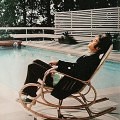
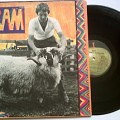
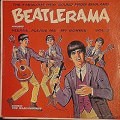
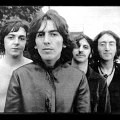


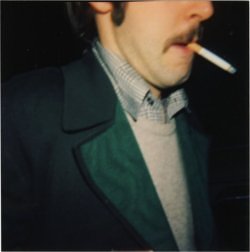
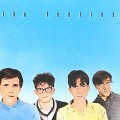
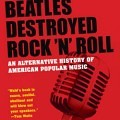
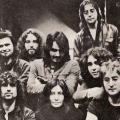

I like the Smithereens and their album Meet The Smithereens where they do some beautiful Beatle covers. They don’t stray too far from the original arrangements, just enough to make the songs interesting.
I always liked Elvis Costello’s live version of All You Need Is Love where he introduced it onstage as an “old Northern English folk song.” I also like his version of Penny Lane at the White House tribute to Sir Paul.
Phil Ochs did a live performance, sometime around 1964, just voice and acoustic guitar, of I Should Have Known Better to an amused folk audience. They thought he was making fun of the song, but he explained that the Beatles were the most exciting thing to happen to music in a long time. His statement was greeted with polite silence. Like Dylan, Phil Ochs appreciated the Beatles from the beginning.
– Hologram Sam
I found the Phil Ochs version of John’s song on youtube. I hadn’t heard it in years. Here’s the link:
http://www.youtube.com/watch?v=nv8vJ3f3AoM
The audience clearly thinks it’s a joke, with some in the crowd providing fake screams in the middle of the performance, but Phil is sincere at the end of his performance about how exciting and good he found the song.
Phil was ahead of his audience.
– Hologram Sam
I also enjoy a very different version of ‘I Should’ve Known Better’ by THE BEATLES -not just John. 🙂
She and Him is a band I really enjoy. I first got into them bc of their cover of Smokey’s ‘You’ve Really Got a Hold On Me’ which is probably my favorite all time song that was written by someone born outside of Liverpool.
Here is their Hawaiin take on ‘I Should’ve’
http://www.youtube.com/watch?v=Z3oZkTPv550
Here is ‘You’ve Really’
http://www.youtube.com/watch?v=2pZ_a4qZK_Q&feature=related
And here is the lovely Nina Simone covering George and his sun. Just beautiful.
http://www.youtube.com/watch?v=xr8ol8ufSRg
My favorite Beatles cover is Stevie Wonder’s “We Can Work It Out”. Stevie changed the arrangement and made the song his own.
In my opinion, the best cover of a Paul McCartney song is Sloan’s version of “Waterfalls,” which appeared on the Paul and Linda McCartney tribute album titled Listen To What The Man Said. The group sped up the tempo and it sounds much more exciting than the funereal version Macca recorded.
Speaking only to these two covers, I much prefer Laibach’s cover of “Across the Universe.” The van Dyke cover of “Hey Jude” reminded me of sitting in the back of an old church during a funeral on a cold, rainy day, with the pipe organ wheezing in and out of time.
Laibach, on the other hand, got the poignant contradiction of “Across the Universe,” the hopeful verses and the hopelessly depressed chorus. The song to me has always been a sort of mirror image of “All You Need is Love,” which has a hopeful chorus with darkly pessimistic verses. But then that was John Lennon in a nutshell, the right brain always trying to cajole the left brain into believing something the left brain knows isn’t true.
Nice comment, Monkey.
Holy shit, I just lost a HUGE comment. Oh I’m so sad.
Yes, great comment, @Monkey. I’m not going to do justice to my thoughts in this rewrite, and forgive me if it’s a bit blunt or unclear.
“There’s nothing you can do that can’t be done.
Nothing you can sing that can’t be sung.
Nothing you can say but you can learn how to play the game.
It’s easy.”
This is very close to Buddhist philosophy; and it’s also very evocative of the specific kinds of insights that one can get during meditation. It’s not “There’s nothing you can do that can’t be done…so why try?” It’s that everything is fundamentally OK; you don’t NEED to do anything, or fix anything, or change anything. Things are as they are, and that’s OK, and (good news!) there is a way to play this game skillfully: All you need is love. Substitute “lovingkindness” and that’s straight-up Buddhism.
As to Across the Universe, the entire first verse is a very accurate description of what a meditating mind can feel like. And once again, “Nothing’s gonna change my world” can be read as reassurance, not impotence. Topped with “Jai Guru Deva Om,” we have a unified whole.
We know that Lennon was reading Eastern philosophy, and later meditating, from 1966 to early ’68; we also know that his behavior became markedly different–that he was more open, more social, less concerned about money, less violent and vituperative than before or after. Goldman points to the euphoric effects of chronic LSD use, but I wouldn’t know about that. I do have some limited experience with meditation, and so that’s what I think of.
And I think we should be careful: the idea of a conflicted Lennon is attractive because it feels smart–smart people are conflicted, right? They want to do good things, make the world a better place, but then there’s bills to pay, and we need electricity, and and and. But that confusion doesn’t let us off any hook, it only allows us to be more comfortable in a situation where we probably should feel uncomfortable. Lennon was conflicted about his wealth (for example) because he should’ve been; his post-Yoko interviews are literally full of incredibly lame self-justification. This doesn’t make him smart; it makes him foolish. “All You Need Is Love” isn’t foolish; it’s explaining why benefit concerts like Bangladesh are big drags and not worth doing, that’s foolish. It’s Lennon operating out of a scared, selfish, materialist, egotistical place, and he knows it.
My guess is what happened to Lennon is that his “pools of sorrow” were quite vast, and–as is common in isolated, intense meditation–Rishikesh brought all that to the surface. It was CRAZY for them to go from rockstar London to meditating for eight hours a day. That kind of practice often brings intense discomfort to even experienced meditators who’ve worked up to it. But if you have a good, supportive community around you, you can get through it and drain some of those pools for good. Lennon got to the point of pain, then could not muster the courage to really change. He had no friends, no true support network, just a bunch of syncophants, courtiers, and rivals.
As with George, the circumstances of his life gave John Lennon a level of temptation and stimulation unknown to an average person like me, so I don’t judge him for quailing; I don’t think I could’ve done any better in his shoes. But I do wish he had, for his own sake–and I think that All You Need Is Love and Across the Universe are Lennon in moments where he genuinely saw something better, and was trying to encourage himself and the world to reach for it. That’s a more conventional reading than yours, @Mystical, but I think it’s a defensible one that I prefer.
This is what I believe went down in Rishikesh:
http://www.youtube.com/watch?v=6frgnqTo1eM
The Brooklyn ensemble ALARM WILL SOUND did a very faithful live version of Revolution Number 9. Here is a link to their performance:
http://www.youtube.com/watch?v=_WjfQSxcq0c
– Hologram Sam
I had a non-Beatle-people roommate who handed me his copy of the Laibach album and insisted I play it. I only listened to it once, but my impression was that I couldn’t even identify some of the songs they were covering. Maybe after a dozen years it’s time for another listen.
When Anthology 2 came out, I’d had said roommate listen to take 1 of Tomorrow Never Knows and he said it sounded like Skinny Puppy, so maybe there’s room for me to expand into a bit of industrial.
Could we consider the Replacements’ Let It Be to be a cover of Let It Be, lacking not only the title track but indeed all the other songs–keeping nothing but the (great) title?
Here’s Louis Van Dyke’s Nowhere Man
https://www.youtube.com/watch?v=LYLaPTW41uk